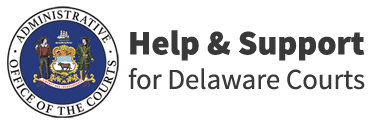Arraignment in the Court of Common Pleas
What is a misdemeanor trial?
The Court of Common Pleas has jurisdiction over misdemeanor offenses generally punishable by a fine and/or a jail term. At trial, the prosecution, or Deputy Attorney General on behalf of the State, will call witnesses and introduce evidence to try to prove that the defendant is guilty of the crime with which he/she is charged.
A fundamental principle of our system of justice is that every person charged with a crime is presumed innocent. The prosecution has the burden of proving that the defendant is guilty beyond a reasonable doubt throughout the trial. A reasonable doubt is not a mere possibility or imaginary doubt, but a doubt that prevents an individual from being firmly convinced of a defendant's guilt.
The party, or the alleged victim who brought the charge(s) against the defendant, will be noticed to appear and will testify on behalf of the State at the trial. More information about presenting witnesses. If the defendant wants the Court to send "notices" to the defendant's witnesses to appear, he/she must notify the Clerk's Office at least ten (10) days before trial. If the defendant believes the witnesses may not appear, he/she may ask the Court to issue a "subpoena." The Court can also issue a subpoena for documents or other evidence that the defendant may need for his/her defense and which is not in their possession. The request for subpoenas must be made with the Clerk's Office no later than ten (10) days before the date of trial. Failure to respond to a subpoena is grounds for arrest.
At trial, the defendant has the right to introduce evidence of his/her innocence and to have witnesses testify on their behalf. It is the defendant's responsibility to have his/her witnesses and evidence with them on the day of trial. The defendant has a right to testify on his/her own behalf or to remain silent. If the defendant chooses to testify, the Judge may consider any statement made in determining the defendant's guilt or innocence. If the defendant exercises his/her right not to testify, it will not be held against him/her.
Going to Court
On the scheduled day of trial, the Defendant and all witnesses should appear at the time indicated on your "Notice to Appear" and check in with the Bailiff. The Defendant and all witnesses should bring any photographs, diagrams, reports or any other exhibits with them on the day scheduled for trial.

